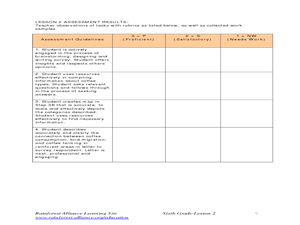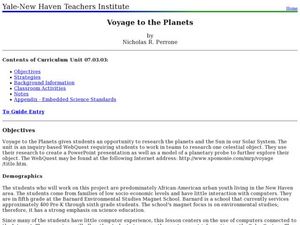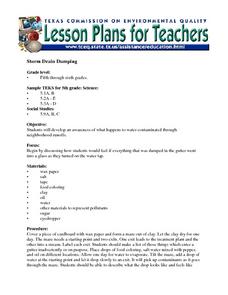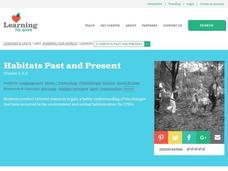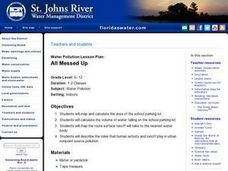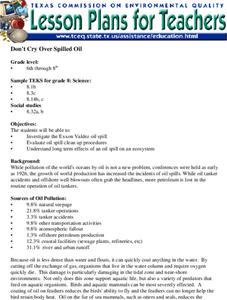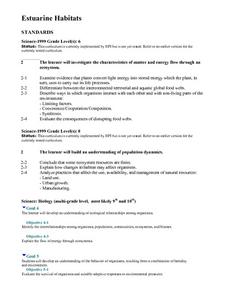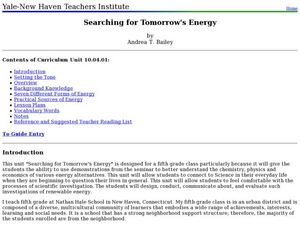Curated OER
Getting the "Yuck" Out
Students examine various types of household materials for their usefulness as filters. They work together in teams to design a filtration system that produces the cleanest water in the shortest time.
Curated OER
Earthquake!
Students gain an understanding of earthquakes. They examine vocabulary associated with earthquakes, how earthquakes happen, and preventive measures taken to diminish damage or harm in the event that an earthquake should happen.
Curated OER
Know Your Watershed
Learners investigate the importance and the location of their own watershed by visiting and EPA website and also work in groups to create an action plan on how to protect their local watershed.
Curated OER
Cougar or Human: Which Needs Protection?
Students research the biology and natural history of the cougar. Students conduct Internet research to determine how cougars have been protected by humans and how it is affected by human decisions. Students write about reconciling...
Curated OER
What If We Run Out?
Students explore the consequences of shrinking habitats and the human impact on wildlife populations. They participate in a game to study the consequences and describe the preservation of animal habitats.
Curated OER
Whose Breakfast isn't for the Birds?
Students explore coffee production. In this cross-curriculum rainforest ecology lesson, students research regions where coffee comes from and investigate how the native birds in the rainforest are effected by coffee...
Curated OER
Voyage to the Planets
Students examine the planets in the solar system. In this planetatry activity students complete a project using a WebQuest program.
Curated OER
Storm Drain Dumping
Students conduct an experiment to show how water gets contaminated through neighborhood runoffs.
Curated OER
N, B, and T: Pollutants Three
Students explore nutrient, bacterial, and toxic surface water pollution. They identify the amount of water they use each day and summarize the kinds of substances that cause water pollution. They predict what will happen in water...
Curated OER
Habitats Past and Present
Students explore the changes in animal habitats. In this ecosystem lesson plan, students use the Internet to explore the changes in the environment since the 1700's. Students complete a Venn diagram to compare the differences in the...
Curated OER
Green Space in the City
Students examine city parks and their importance and affect they have on the health and well being of a community. An oral report with visual aids is prepared as a group to educate the class on the importance of green space in the city.
Curated OER
Field Of Beans
Learners investigate the concept of crop farming. They plant small fields to test different theories of agriculture. Students keep care over the fields, including pest and weed control. Learners make and record daily observations to...
Curated OER
Who Works in This Forest?
Students examine the variety of jobs that are related to working in the forest. Information on the different jobs is provided in this lesson plan for the teacher to share with the students. The students create a collage using magazines...
Curated OER
All Messed Up
Students begin the experiment by mapping and calculating their school parking lot. They calculate the volume of water falling on the lot and map the route the water runoff takes. They discuss the roles that humans play in affecting water...
Curated OER
Don't Cry Over Spilled Oil
Students study the Exxon Valdez Oil Spill while evaluating oil spill clean up activities. They discover the long term impact can have on an ecosystem by completing this experiment.
Curated OER
Estuarine Habitats
Sixth graders study the important habitats, flora, fauna, and physical factors of coastal habitats. They compare the aquatic habitats to terrestrial habitats by researching and completing tables with the information.
Curated OER
Birds of A Feather
Young scholars observe and record the many types of birds they see in a month. They discover the many patterns birds follow and compare their results with other classrooms. They complete a field assessment as the final activity for this...
Curated OER
Water Walk
Students conduct a visual survey to discover information about local land use and water quality; document their findings by mapping and profiling the water body; and use this initial investigation to raise questions about local land use.
Curated OER
What Are We?
Pupils describe different types of water pollutants. They complete experiments in which they observe the affects of water pollution on algae. They also brainstorm and list three causes of each water pollutant.
Curated OER
Optional Laboratory: Soil Particle Size and Texture
Students work together to perform experiments on different types of soil. They record the soil's pH level, color and texture. They develop hypothesis' on what they believe they will discover before beginning the experiment.
Curated OER
Diseases Are Real
Eleventh graders research industries that contribute to sanitation and pollution problems. They investigate the direct result of unhygienic practices including disease outbreaks or specific illnesses. They create a Power Point...
Curated OER
Habitat Choice in Woodbugs
Students investigate woodbugs. In this scientific investigation lesson, students explore the steps scientists take when conducting an investigation using live specimens. Students explore habitat preferences for woodbugs in various...
Orange County Water Atlas
Location, Location, Location…
Young geographers discover not only how to read and recognize coordinates on a map, but also gain a deeper understanding of latitude and longitude and how climate changes can vary significantly across latitudes.
Curated OER
Searching for Tomorrow's Energy
Fifth graders investigate energy. In this biology lesson plan, 5th graders will learn about energy, fossil fuels, and renewable and nonrenewable resources. Students will be participating in three lab activities which are described in...





